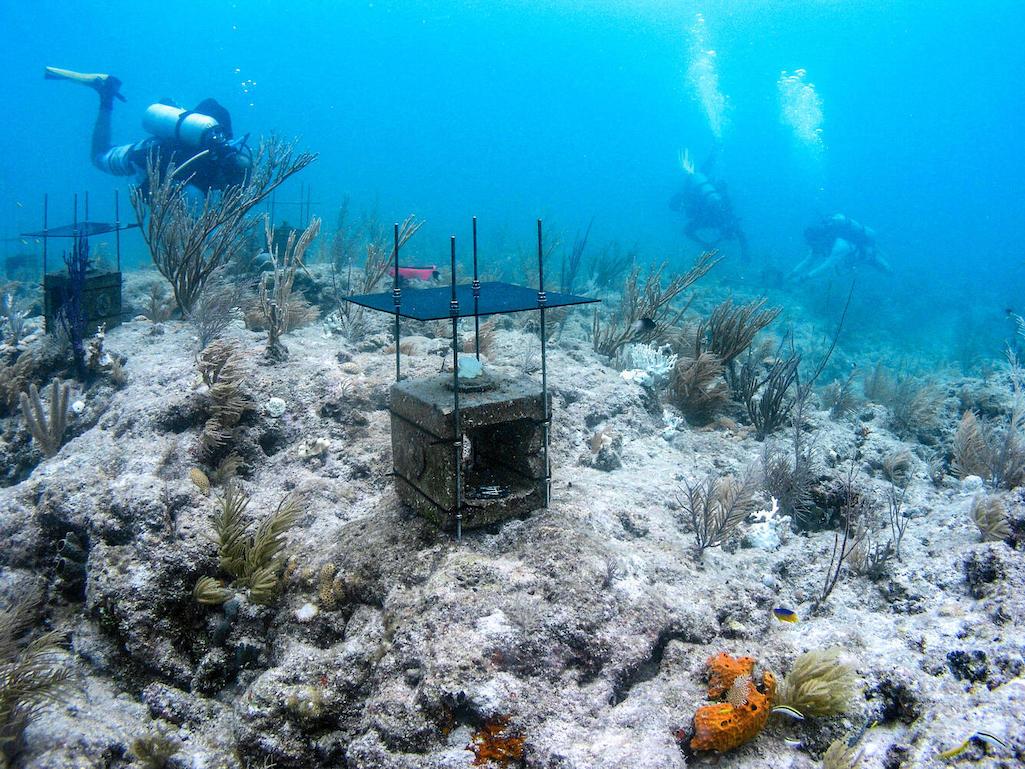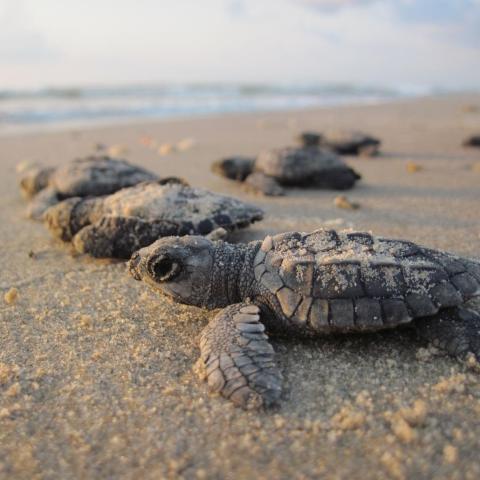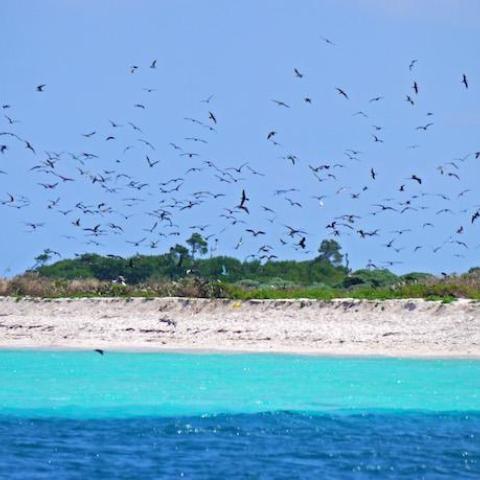
Shown here is a colony of the threatened Elkhorn coral, Acropora palmata, that has become "bleached," that is, lost all its algal symbionts (also called zooxanthellae) because of the summer 2023 ocean-heat wave. The coral is attached to a cement block as part of the U.S. Geological Survey’s Coral Assessment Network (USGS-CAN) that provides data on coral-growth (calcification) rates throughout the western Atlantic. Data like these are collected to document seasonal and spatial patterns in coral growth that correlate with ocean conditions and are used to guide the management and restoration of coral species that have experienced population declines across the region. Pictured here is one of calcification stations located in Dry Tortugas National Park. When photographed on August 15, 2023, this coral was showing areas that were completely bleached but still alive (areas of the colony that are white), areas where the coral tissue still contained some symbionts (brownish areas on the undersides of coral branches), and areas that were already dead (area of colony in foreground encrusting the cement block showing growth of filamentous seaweed starting to grow on the empty coral skeleton). The shade structure could help to reduce light stress that is problematic when corals are in a bleached state/USGS
Editor's note: The following article is from a U.S. Geological Survey release.
In a bid to help corals survive during rising ocean temperatures, scientists have erected sun shades above elkhorn corals, a threatened species, at Dry Tortugas National Park in Florida.
“The shading can help by reducing the sun’s rays,” said Ilsa Kuffner, a U.S. Geological Survey research marine biologist who helped lead efforts to save corals in Florida in August. “While normally corals need sunlight for their symbionts to photosynthesize, when they are bleached, the sun’s energy instead causes a lot of stress.”
Three USGS scientists from the St. Petersburg Coastal and Marine Science Center traveled to Dry Tortugas in mid-August to erect temporary shade structures with hopes they would lessen the effect of the sun’s rays and help the corals survive until the fall, when water temperatures traditionally drop. When experts arrived at the park, they found much of the corals had lost their color: they were bleached.
Coral bleaching occurs when ocean temperatures reach and remain above about 87 degrees Fahrenheit. During bleaching the nutrient-giving microscopic algae that normally live within corals are expelled, and without the symbiotic algae, called zooxanthellae, corals are likely to starve, and may die.
The team spent several days doing emergency fieldwork adding nearly 40 temporary shade structures to corals located inside Dry Tortugas National Park. They then moved to Biscayne National Park where two more USGS scientists joined in the effort and the team was able to shade additional corals.
In Dry Tortugas National Park, the team took an additional life-saving measure in attempts to feed the corals. Several evenings during the emergency mission, the team added dim lights to the shaded coral in hopes of attracting prey for the coral to feed on.
“The catastrophic ocean-heat wave that is occurring in Florida and spreading quickly to the rest of the western Atlantic and Caribbean presents a huge risk to the health and future of coral reef ecosystems,” Kuffner said.
The scientist said they realize they can't save every coral, and so "are focusing on individual corals that represent unique genetic lines that are thought only to exist in certain national parks."

Three USGS scientists install shade structures over experimental Elkhorn corals that have become "bleached," that is, lost all their algal symbionts because of the summer 2023 ocean-heat wave. The corals are attached to cement blocks as part of the U.S. Geological Survey’s Coral Assessment Network that provides data on coral-growth rates throughout the western Atlantic/USGS, Ilsa Kuffner.




 Support Essential Coverage of Essential Places
Support Essential Coverage of Essential Places







Comments
Sillyness.
https://reefbuilders.com/2022/08/06/great-barrier-reef-records-highest-h...